Events and speakers
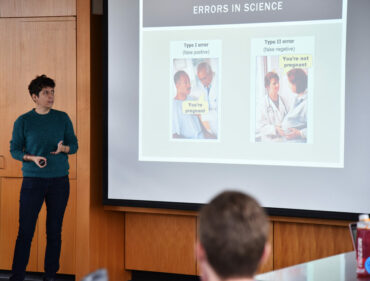
Feb. 13, 2019
What makes us trust science?
Mariah Cox | Bond LSC When Simine Vazire began teaching undergraduate research methods she focused on its difference from pseudo-science or nonscience, the value of the scientific method and the notion that science is self-correcting. However, it became harder for her to teach that lesson with a clear conscience as she began to grapple with issues of credibility and replicability in the field of psychology with her own research. “Credibility is arguably the eye of the storm of the in the replication crisis. I didn’t call this the replication crisis in psychological science because that’s pretty controversial,”…
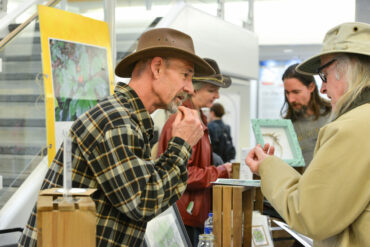
Jan. 28, 2019
10th annual Agroforestry Symposium focuses on entrepreneurship in research
Rob Riedel from Wild Ozark Ginseng Farm introduces their products at the Agroforestry Symposium on Jan. 26, 2017 | photo by Jinghong Chen, Bond LSC By Mariah Cox | Bond LSC Farmers, scientists and tree experts, from field to forest, will bring their work inside this Wednesday and Thursday to hear how research can improve all of their livelihoods. The 10th annual University of Missouri Center for Agroforestry Symposium is set to take place Jan. 30-31 at the Bond Life Sciences Center on the University of Missouri’s campus. The two-day event will focus on innovation and…
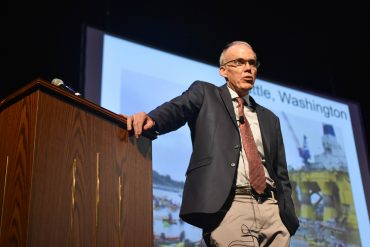
Oct. 16, 2017
McKibben urges climate action in campus lecture
Bill McKibben explained the impact of increasing carbon emissions on the global climate and explored solutions to slowing the trend Bill McKibben responds to an audience member’s question at his lecture on Oct. 4 in Jesse Hall. The screen behind him shows demonstrators blocking an oil rig from leaving harbor. McKibben called them “kayak-tivists.” Photo by Eleanor Hasenbeck | Bond Life Sciences Bill McKibben responds to an audience member’s question at his lecture on Oct. 4 in Jesse Hall. The screen behind him shows demonstrators blocking an oil rig from leaving harbor. McKibben called them…
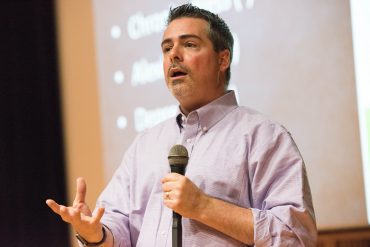
Oct. 11, 2017
The power of a hug
Kory Floyd speaks about humans’ need for affection. Floyd spoke during the 13th annual Life Sciences and Society Symposium on Saturday, Oct. 7. | Photo by Roger Meissen, Bond LSC By: Samantha Kummerer, Bond LSC Kory Floyd was stressed and having an all-around bad day, but then a coworker offered him a hug. “That hug didn’t change anything about what had gone in my day but it changed everything about what the way that I felt,” Floyd said. “Suddenly all that stress, suddenly all that disappointment, all that worry, it didn’t go away but it seemed…
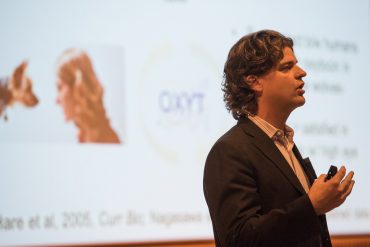
Oct. 10, 2017
Being friendly can payoff
Dr. Brian Hare speaks about how friendliness and natural selection are connected at the 13th annual LSSP symposium, The Science of Love. | photo by Roger Meissen Hare explains survival of the friendliest as component of natural selection By Allison Scott Dogs really are a man’s best friend if you ask Brian Hare. Our four-legged friends are a direct result of chance coupled with domestication. And over the course of hundreds of years, that domestication has led to deep bonds between humans and dogs. “You love your dog, physiologically, the same way as your…
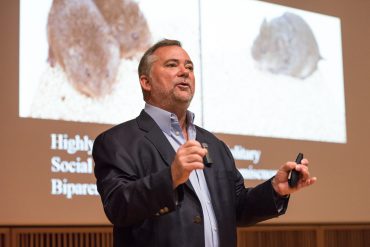
Oct. 9, 2017
Forming a bond
Dr. Larry Young opens the second day of The Science of Love. | photo by Roger Meissen Larry Young explores chemicals behind monogamy in prairie voles, humans By Allison Scott Upon first glance, it wouldn’t seem that humans and small rodents have that much in common. However, Larry Young extensively studies the prairie vole because their desire to mate for life. “Prairie voles mate for life,” Young said. “That’s very unusual, in fact, only three to five percent of mammals do this.” This commonality between the small mammal and humans allows Young to relate…
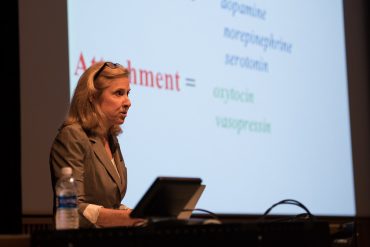
Oct. 7, 2017
Balancing lust, romance and attachment
Dr. Helen Fisher opens the 13th annual LSSP symposium, The Science of Love, on Friday, Oct. 6. | photo by Allison Scott Helen Fisher delves into the relationships we choose and why in our digital age By Allison Scott | Bond Life Sciences Center We might not understand what drives us to establish and maintain romantic relationships, but Helen Fisher has made her living trying to figure it out. The romantic love expert spoke Friday, October 6, in Bond LSC about the neurological reasons behind why humans behave the way they do. “Romantic love…
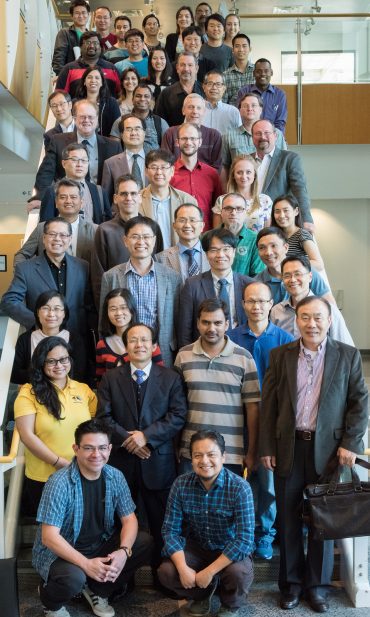
May 12, 2017
Old friends, new ideas
A partnership between MU and Gyeongsang National University in South Korea has created lasting connections By Eleanor Hasenbeck | Bond Life Sciences Center Discussion went global this week as researchers converged from Gyeongsang National University in South Korea, MU and Washington University at Bond Life Sciences Center for the sixth MU-GNU International Joint Symposium in Plant Biotechnology. Plant biologists from each university shared their research, ranging from molecular biology and signaling to breeding soybeans for improved yields. The symposium is held every two years, alternating locations between the U.S. and South Korea. This conference marks the eleventh…
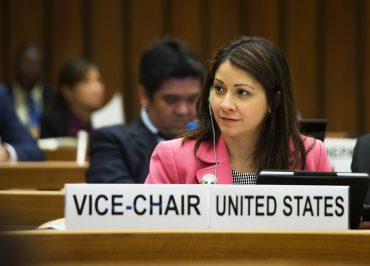
April 5, 2017
From neuroscience to negotiations
Neuroscientist and former Secretary of State science adviser to speak at Life Sciences Week By Eleanor C. Hasenbeck | Bond Life Sciences Frances Colón has spent the past decade representing the United States all over the world on topics ranging from climate change to the advancement of women scientists. She will reflect on that experience in her talk at 3:30 p.m. Monday, April 11 in Monsanto Auditorium. | Photo courtesy of Frances Colón A career in science doesn’t only mean working in a lab, and no one knows that better than Frances Colón. Colón, a…
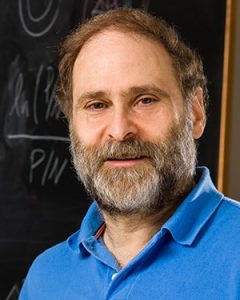
April 4, 2017
National Cancer Institute researcher to speak at Life Sciences Week
By Jinghong Chen | Bond Life Sciences Center “Living things are too beautiful for there not to be a mathematics that describes them.” Thomas D. Schneider will speak Tuesday, April 11 in Bond LSC’s Monsanto Auditorium. | Photo by National Institutes of Health This is Thomas Schneider’s motto. Schneider, a research biologist at the National Cancer Institute, spent most of his career understanding math and its relation with fundamental biology. His lab focuses on the DNA and RNA patterns that characterize genetic control systems; they invented the widely-used sequence logos. “In the first place, I…
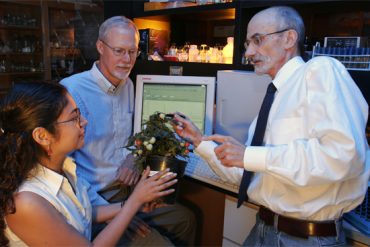
April 3, 2017
Hanson to explain why broken metabolites matter at Life Sciences Week
By Jinghong Chen | Bond Life Sciences Center Andrew Hanson, right, will speak Friday, April 14 in Bond LSC’s Monsanto Auditorium as the 2017 Dr. Charles W Gehrke speaker. | Photo by University of Florida, Institute of Food and Agricultural Sciences People often think of metabolism as a perfect network. But that assumption is simply not accurate. Andrew Hanson, an eminent scholar and professor at the University of Florida, describes the misunderstanding as “the power of a paradigm.” American biochemist Albert Lehninger spread the misunderstanding in his classic textbook “Biochemistry”, in which the message he…
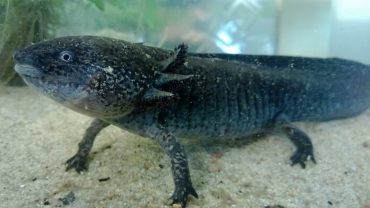
March 21, 2017
Harvard researcher to speak at Life Sciences Week
Jessica Whited studies the genetics behind how salamanders grow severed limbs By Eleanor Hasenbeck | Bond LSC An axolotl rests at the bottom of its tank at Menagerie du Jardin des Plantes in Paris. | photo by Jack Baker, Flickr It takes about two months for an axolotl to regenerate a lost limb. Humans, as you probably know, don’t regenerate limbs. But, a basic understanding of how the Mexican salamander regrows limbs advance regenerative medicine in humans according to Jessica Whited, a researcher at Brigham Women’s Hospital and assistant professor at Harvard Medical School. Whited will…